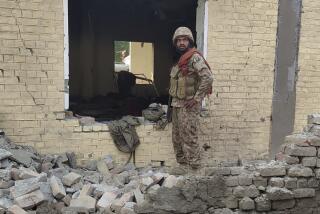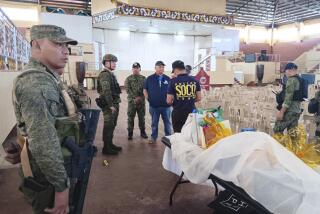Blast Kills U.S. Man, 22 Others
- Share via
ZAMBOANGA CITY, Philippines — A bomb concealed in a backpack exploded outside a major airport in the turbulent southern Philippines on Tuesday, killing at least 23 people, including a U.S. missionary, authorities said.
More than 140 people were wounded in the explosion at the international airport in Davao City, some seriously, and officials fear that the death toll could rise. Among the injured were three members of an American missionary family, officials said.
President Gloria Macapagal Arroyo called the attack a “brazen act of terrorism that will not go unpunished.” Authorities said five members of the Moro Islamic Liberation Front were arrested in connection with the bombing. Arroyo left early today for Davao City to oversee the police investigation.
The explosion came as fighting between government troops and three rebel groups intensified in the country’s southern region, particularly on the island of Mindanao. Davao is the largest city on the island and the largest in the country after Manila.
In Washington, the White House said the blast appeared to be a terrorist attack.
“The president condemns the bombing in the Philippines,” White House Press Secretary Ari Fleischer said. “We are working closely with the Philippine government, which has fought valiantly in the war on terror.”
The blast occurred about 200 miles east of a military base in Zamboanga City where U.S. troops are training Philippine soldiers in anti-terrorism techniques. The Pentagon recently announced that it would send combat troops to battle the rebel Abu Sayyaf group on Jolo island southwest of Mindanao, but the plan was shelved because the Philippine Constitution prohibits foreign troops from fighting here.
The dead American was identified as William Hyde, 58, a Southern Baptist missionary from Iowa.
The bomb exploded about 5:20 p.m. near a rain shelter outside the terminal shortly after a flight arrived. Dozens of people waiting for passengers were huddling in the shelter to avoid a downpour when the bomb went off, sending shrapnel and glass shards through the crowd. The bomb apparently was detonated by a cell phone wired to the device.
Shortly after the blast, a bomb exploded outside a clinic in the nearby town of Tagum, injuring three people.
With a major crackdown on crime, Davao has recently promoted itself as “the most peaceful city in Southeast Asia.”
Some officials had suggested that the airport attack might have been carried out by the Moro Islamic Liberation Front, or MILF, a large armed group seeking to create an Islamic state in the southern Philippines.
For the last 1 1/2 years, the group and the government have observed a cease-fire, but the truce collapsed last month and the MILF declared that hostilities would resume.
The guerrillas are accused of carrying out several attacks in recent days, including the bombings of a power station and transmission towers, that knocked out electricity in the region.
MILF spokesman Eid Kabalu denied responsibility for Tuesday’s deadly blast.
“We have nothing to do with the airport attack,” he said. “We are not capable of hurting civilians.”
Suspicion also has fallen on Jemaah Islamiah, the Southeast Asian Islamic terrorist network that is linked to Al Qaeda and is blamed for an Oct. 12 bombing on the Indonesian island of Bali that killed 202 people. The network has been involved in terrorist attacks with members of the MILF.
Another candidate in the airport attack is the Abu Sayyaf, which was once an Islamic separatist group but in recent years has become primarily a kidnapping gang.
Abu Sayyaf leader Hamsiraji Sali claimed in a telephone interview with a television station today that his group was responsible for the airport bombing. But he said the device was supposed to explode at night when no one was there to get killed. Sali said the bomber was in Abu Sayyaf custody and would be punished for his mistake.
Authorities say Abu Sayyaf was responsible for a bombing in October that killed a U.S. Green Beret and three Filipinos in Zamboanga City.
More recently, the Philippine government expelled an Iraqi diplomat after evidence surfaced that he was in touch by telephone with an Abu Sayyaf member connected to the bombing. Intelligence officials suggest the diplomat may have been seeking terrorists to carry out attacks against Americans.
Yet another possibility is the New People’s Army, the armed wing of the Communist Party of the Philippines, which is waging war in Mindanao and other parts of the country to overthrow the government.
*
Times staff writer Paddock reported from Bangkok, Thailand, and special correspondent Jacinto from Zamboanga City.
More to Read
Sign up for Essential California
The most important California stories and recommendations in your inbox every morning.
You may occasionally receive promotional content from the Los Angeles Times.











